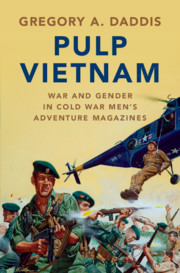'This brilliantly analyzed history dismantles masculine archetypes portrayed by media during the Vietnam War. Daddis explores the ways fantasy images of war have been perpetuated throughout history and have given young men unrealistic, warped views on masculinity.'
'Hitherto overlooked among 'the things they carried' in Vietnam were thousands of pulp magazines. Daddis scrupulously dissects the delusions of supremacy - sexual, racial, and martial - comic books fueled, with disastrous results for both American soldiers and Vietnamese civilians. A richly illustrated, coruscating exposé of toxic masculinity at its most lethal.'
Susan L. Carruthers - author of The Good Occupation: American Soldiers and the Hazards of Peace
'A disturbing yet vital study that renders transparent the connection between pop culture and ‘martial masculinity’ during the Vietnam War. American GIs were woefully misled by these ‘macho pulps’ that helped plant toxic ideals of manhood, and the Vietnamese (friend or foe, and particularly women) would pay for this dangerous melding of war and sex.'
Lien-Hang T. Nguyen - author of Hanoi’s War: An International History of the War for Peace in Vietnam
'In Pulp Vietnam, Gregory A. Daddis brilliantly explores the strange, gaudy, and wildly misleading cultural baggage innumerable American soldiers carried through the jungles and rice paddies of the Vietnam War. Steeped in the imagery of pulp magazines during the 1950s and early 1960s, thousands of young men were encouraged to conflate hypermasculine heroism with the prospect of sexual conquest and sexual reward. In clear, measured, meticulously composed sentences, Daddis levers open a new and important window on the American war in Vietnam, a window through which the reader may glimpse the psychological origins of debacle, disappointment, betrayed expectations, cartoonish fantasies, wartime travesties, and postwar nightmares.'
Tim O’Brien - author of The Things They Carried
'In Cold War men’s adventure magazines, all the men were brawny, virile, and victorious, and all the women were beautiful, buxom, and willing. In an insightful blend of military, gender, and cultural history, Pulp Vietnam reveals the dangerous ways these fantasies collided in a war that failed to measure up to GIs’ expectations.'
Kara Dixon Vuic - author of The Girls Next Door: Bringing the Home Front to the Front Lines
'Pulp Vietnam is a wonderful contribution to the literature on Cold War culture, the Vietnam War, and American gender and sexuality. This book is a good model of what scholars can accomplish when they branch out of their comfort zones, bridge fields, and talk to one another.'
Amy J. Rutenberg
Source: H-Diplo
‘... Daddis clearly makes the case for the uncomfortable impact of these peculiar magazines and the need for further study. How did these popular magazines shape the ways in which soldiers of an integrated army understood one another? Did the combination of whiteness and violence enflame the racial tensions soldiers brought with them to Vietnam? Daddis’s study opens up a host of possibilities for further inquiry ...’
Nicholas Utzig
Source: The Los Angeles Review of Books
‘… Pulp Vietnam examines an overlooked piece of Cold War culture and explains how it helped create real-world forms of violence.’
Kyle Burke
Source: Pacific Historical Review
‘… a valuable and worthy book that also carries particular significance for our ideas about gender and masculinity today.’
Matthew Barrett
Source: Canadian Military History



